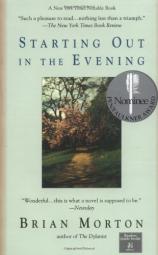Reading Group Guide
Discussion Questions
Starting Out in the Evening

1. When Heather meets Ariel for the first time, she thinks, "I'd be a better daughter for [Schiller] than she is" (p. 13). Why does Heather believe this? Do you agree or disagree with her? What does this belief reveal about her character? By the end of the novel, does she change her opinion? If so, why?
2. The author spares few details when describing Leonard Schiller's physical appearance and health. Why is this information crucial to understanding the encounter between Schiller and Heather in his bed? Do you consider this to be a sexual encounter or something of a different nature? How does Heather try to reconcile her fantasy of his apartment as "a seat of power" with the reality of the "sad smell of an old man living alone" (p. 10)? What does Heather hope to accomplish by becoming part of Schiller's life? Does he comply fully with her wishes? Why, or why not?
3. Heather credits reading Leonard Schiller's first novel with beginning a new life for her when she was sixteen. Have any books inspired great change or new understanding in your own life? Which one(s), and why? Have you, like Heather, been motivated to seek out and meet the author of these books?
4. Do you think Ariel's philosophy, "Go with the skid" (p. 19), has served her well? How does the scene in which Heather's rental car skids out of control (pp. 16-18) illuminate the differences between these two women? With which character do you identify more? Why?
5. After studying Schiller's life and works, Heather finds she is unsure "if he was a hero or if he had wasted his life" (p. 270). In your opinion, which of these alternatives is closer to the truth? What are his strengths and weaknesses as a husband? A father? A friend? An artist? Do you feel that there is "brilliancy" in his life?
6. Why do you think Casey and Ariel are drawn back into each other's lives? Do you feel they will be compatible in the long run? Do you believe Ariel can be happy with the compromise she may have to make in order to remain with Casey? If she chooses to "become a grown-up" (p. 294), do you think the nurturing aspect of Casey's personality will be able to cope with the loss of the childlike Ariel who has needed his protection? Can they have a fulfilling life together if she decides to "remain a child" (p. 294)? What role, if any, does Leonard play in her decision?
7. Do you find Stella to be a strong presence throughout the book? How has her death affected the other relationships in Schiller's life --- with Ariel? With his work? With his friend Levin? With Heather? How would you describe his reunion with Stella when he finally returns to their spot in Paris?
8. What is the significance of the novel's title vis-á-vis the relationships between Schiller and Heather, Ariel and Casey, and Schiller and Stella? Why do you think the author has set the final scene in the evening, watching for the comet? Did you find it to be a satisfying conclusion for the novel? Why, or why not?
9. Compare and contrast Heather's relationship to the literary world with that of Leonard Schiller. Are the differences attributable more to their ages or to their personalities? How do the friendships between Schiller and Leslie, the book editor, and between Heather and Sandra, the Bomb editor, illustrate these dissimilarities? What, in your view, are the greatest differences between Schiller's "New York intellectuals" and the media elite of today? In which world would you feel more comfortable?
10. The author writes that Schiller, like the great philosophers, "had practiced dying for a long time" (p. 70). Why has he chosen such an ascetic life? How does Heather react upon discovering that the creator of the fictional characters that have inspired her to live so freely is in reality a man cautious to an extreme? Would she have been better off not learning this? Why does she think she can change him? Why is she willing to try so hard to do so?
11. Do you feel Schiller's and Ariel's concerns regarding posterity are similar? If so, why do they often have difficulty understanding each other? Do you feel their worries about future generations hinder their ability to exercise good judgment in the present? Are their fears justified?
12. At the novel's conclusion, why does Heather decide she no longer needs Schiller --- or anyone else --- to be her mentor? Why does Schiller slap Heather during their last encounter (p. 300), and how does this action affect her?
Starting Out in the Evening
- Publication Date: July 1, 1999
- Mass Market Paperback: 325 pages
- Publisher: Berkley Trade
- ISBN-10: 0425168697
- ISBN-13: 9780425168691







